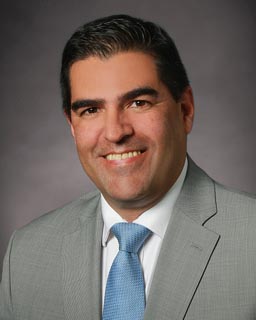Nuclear engineering department head contributes to international think tank
11/26/2019
By Tessa M. Woodring
UNIVERSITY PARK, Pa. — Jean Paul Allain, head of the Ken and Mary Alice Lindquist Department of Nuclear Engineering at Penn State, along with 42 other experts from various fields comprise a think tank launched by the Colombian government. The group will submit a report of their recommendations for Colombia’s future development on Dec. 5.
“Mision Internacional de Sabios*,” which translates to International Mission of Experts, has been charged by President Iván Duque Márquez of Colombia with shaping the future of Colombia’s development by proposing a vision for the country’s science, technology and societal challenges in the next few decades. The implementation of this vision will be overseen by the newly established Ministry for Science, Technology and Innovation in Colombia and will be included in Colombia’s next National Development Plan*. The National Development Plan specifically focuses on the execution of how Colombia’s national government plans and dedicates its policy efforts and economic resources.
“Our goal is to lay out a vision for the country’s efforts in science, technology and society for the next 10 to 20 years,” Allain said. “The National Development Plan specifically focuses on an implementation phase of opportunities in the next four years.”
Since February 2019, think tank members have held regional and international meetings with a focus on opening discussions with Colombian scientists and representatives from industry and government. The meetings, held in June and September of 2019 in Colombia, resulted in written proposals focusing on the members’ areas of expertise, including science, technology and innovation. Allain attended the September meeting held in Cartagena, Colombia.
The group consists of experts from all over the globe, including the United States, Colombia, the United Kingdom, Chile, Spain, Germany, South Korea and the Netherlands. Allain, a Colombia native and United States citizen, is the only American and the only nuclear engineering scientist serving as a member of the think tank.
“Colombia has an incredible opportunity to diversify its energy portfolio,” Allain said. “As one of the longest-running democracies in Latin America, Colombia is going through an incredible transformation.”
According to Allain, Colombia generates most of its energy from hydropower resources, but there is a rise in the use of natural gas and coal. In order to reduce its dependence on carbon-based sources of energy, such as the currently used crude oil, coal and natural gas, which makes up about 85% of global energy use, Allain wants to propose the use of advanced nuclear energy as a long-term strategy for the country.
“My hope is that in the next few decades the expertise and infrastructure is established to leverage advanced nuclear power coupled to renewables and meet its 100% carbon-free footprint goals, while growing a sustained economy that can pull more than its 40% of the population out of poverty,” Allain said. “It’s one of many opportunities with emerging economies where compact nuclear power generation could make a huge impact to their sustainability and decarbonization goals.”
One area of Allain’s research focuses on compact nuclear reactors, which are smaller than conventional nuclear reactors. Conventional nuclear reactors can produce 1,000 megawatts of electric power or more. Compact nuclear reactors include modular reactors, which produce less than 300 megawatts of electric power, and micro reactors, which produce less than 10 megawatts of electric power. Due to their size, the reactor’s individual parts can be built at a factory and assembled elsewhere, leading to reduced cost and increased ease of use. According to Allain, compact nuclear reactors are ideal for countries with emerging infrastructure as they can be safely transported to remote locations. They can also handle the small, but highly variable, energy demands of less populated areas, and can be linked to other compact nuclear reactors or the larger power grid to manage increased demand as the population grows.
Allain also contributes to is the Industries 4.0 and Convergent Technologies portions of the think tank, working with Maria del Pilar Noriega, director of the Institute of Training and Research of Plastic and Rubber*, Orlando Ayala, former vice president of Microsoft, and Tim Osswald, professor in mechanical engineering at the University of Wisconsin-Madison.
“Working with Maria, Orlando and Tim has been very gratifying and exciting as one of the proposed measures will be a strategic digital expansion in Colombia to impact everything from advanced manufacturing to agro-production,” Allain said.
Allain will contribute his extensive research in nuclear engineering to the group, which also includes Serge Haroche, co-recipient of the Nobel Prize for Physics in 2012; Jorge Reynolds Pombo, a Colombian electrical engineer and inventor of the first external artificial pacemaker; Noh Kyoo-sung, CEO of the Korea Productivity Center; and Rodolfo Llinas, a Colombian neuroscientist and member of the team that led NASA’s Neurolab mission in 1998.
“Serving with leading scientists and thought leaders in a broad set of fields including sustainable energy, social responsibility and bioeconomics to name a few has been very enriching,” Allain said. “Bringing back ideas on how science and technology can transform emerging economies of the world such as Colombia will bring great opportunities for land-grant universities like Penn State to make significant global impact through engagement with academia and industry in that country.”
Allain specifically pointed to work underway by Siela Maximova, research professor of plant biotechnology who is also a Global Faculty Fellow in Penn State’s College of Agricultural Sciences and a Land Grant University U.S.-Colombia Fulbright Scholar, who is facilitating more collaboration between Colombian universities and Penn State, among other U.S. universities.
“We are looking at bringing some of the brightest talent from Colombia to the U.S. as doctoral students,” Allain said. “The goal is to build bridges between top universities in both Colombia and the U.S., including at Penn State. Overall, we are aiming to improve the world’s future.”
Colombia Vice President Marta Lucía Ramírez and the country’s Education Ministry and Administrative Department of Science, Technology and Innovation led by one of Allain’s longtime colleagues, Diego Hernandez, oversee the project. The mission’s final report will be officially presented to the president of Colombia, Iván Duque Márquez, on Dec. 5.
*This website is in Spanish.



